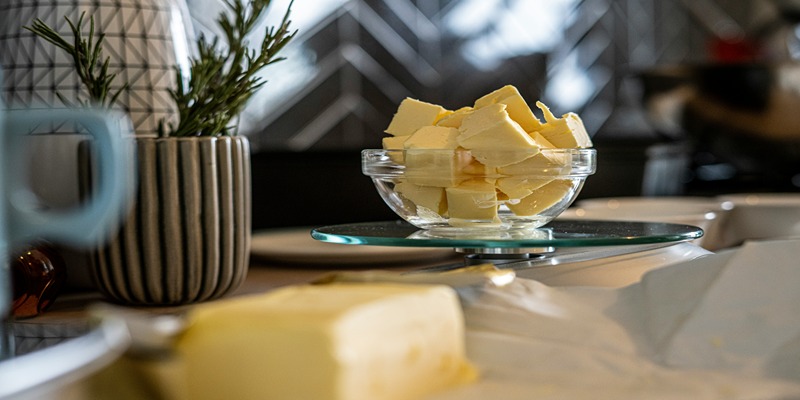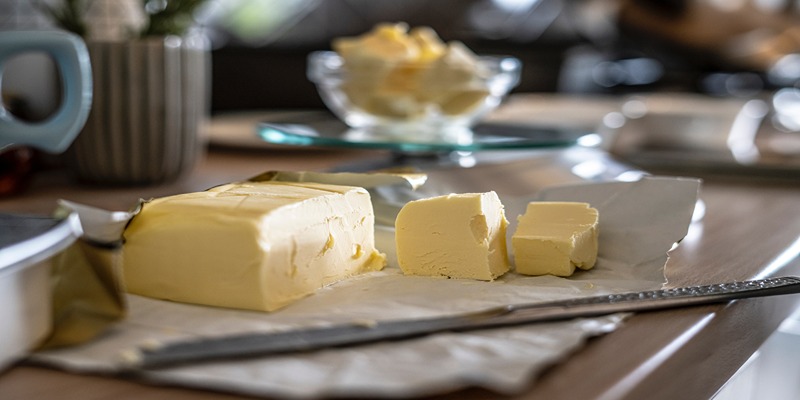Ghee and butter, staples in kitchens worldwide, hold unique places in culinary history. Ghee, clarified butter originating from ancient India, is revered for its rich flavor and healthful qualities. Butter, a familiar favorite in many cultures, offers a creamy taste and versatility in cooking. Both have nourished generations and find use in a myriad of recipes. This article aims to illuminate their differences and benefits. By comparing ghee and butter, we can understand their nutritional profiles, health impacts, and culinary roles. Such knowledge aids in making informed dietary choices, catering to personal health needs and culinary preferences.

Ghee Benefits: A Closer Look
Nutritional Profile of Ghee
Ghee, often considered a superfood, is rich in fat-soluble vitamins and essential fatty acids, making it a nutritional powerhouse. Unlike butter, ghee's clarifying process removes water and milk solids, resulting in a product that is almost pure fat. This process gives ghee a unique nutritional profile, distinct from butter. Ghee is high in vitamins A, E, and D, all vital for maintaining good health. These vitamins play crucial roles in vision, skin health, and immune function.
The health benefits of ghee extend beyond its vitamins and fatty acids. Its high smoke point, around 485°F (250°C), makes it an excellent choice for cooking at high temperatures. Unlike many oils that break down and release harmful free radicals when heated beyond their smoke point, ghee remains stable, retaining its nutritional integrity. This stability makes it a safer choice for frying and sautéing.
Studies suggest that CLA may help in weight management and could reduce the risk of various health issues, including heart disease and cancer. Another significant aspect of ghee is its lack of casein and lactose, making it a suitable alternative for individuals with dairy sensitivities or lactose intolerance.
Health Benefits Associated with Ghee Consumption
Regular consumption of ghee can improve digestion due to its rich content of butyric acid. Butyric acid aids in the repair of the stomach lining and reduces inflammation in the gastrointestinal tract, promoting overall digestive health. Additionally, ghee has been found to boost energy levels, enhance brain function, and improve skin health, thanks to its rich fatty acid profile.
Incorporating ghee into one's diet can provide numerous health benefits. Its unique composition of vitamins, fatty acids, and antioxidants contributes to better heart health, digestive wellness, and overall vitality.
Butter Versus Ghee: Nutritional Face-Off
Comparative Analysis of Ghee and Butter's Nutritional Values
Although they share an origin, the nutritional composition of ghee and butter is quite different. In addition to water and milk solids, butter also includes butterfat. To make ghee, you cook butter until the water evaporates and the milk solids separate. The result is an accumulation of ghee, a kind of pure fat. The milk solids, which contain lactose, casein, and other proteins, are a distinguishing feature of butter. Ghee is easier to digest for those who have issues with lactose or dairy since it does not contain them.
From a nutritional standpoint, ghee outshines butter when it comes to fat-soluble vitamins (A, E, and D). Eye health, immune system support, and bone strength are just a few of the many bodily activities that rely on these vitamins. Butyric acid, which is good for your digestive system, is also more concentrated in ghee. In comparison, ghee contains a lower amount of cholesterol per serving than butter.
Health Implications
Different types of fat, such as ghee vs butter, have different effects on health. Ghee is preferable to butter when cooking at high temperatures since it does not readily form dangerous free radicals due to its high smoke point. Inflammation and oxidative stress are associated with chronic illnesses; this component is critical for lowering the risk of these conditions.
Conversely, a high-fat diet that includes butter may raise LDL cholesterol levels due to the saturated fats it contains. This may pose a risk to cardiovascular health. Even while ghee is also rich in saturated fat, it provides CLA, which may help you lose weight and keep your heart healthy.
A healthy diet includes moderate consumption of both butter and ghee. If you or a loved one suffers from a lactose intolerance, ghee is a great alternative. Just like butter, ghee should be used in moderation by those who are checking their cholesterol levels. In the end, it may come down to personal taste, dietary restrictions, and culinary requirements when deciding between ghee and butter.

Ghee Dietary Advantages: Beyond Nutrition
Ghee's Role in Diet-Specific Lifestyles (Keto, Paleo, etc.)
Due to its unusual makeup, ghee is ideal for several eating plans, most notably the Paleo and Keto diets. Ghee is a great fat to use in ketogenic diets because of the high-fat, low-carbohydrate emphasis that these plans advocate. The ketogenic principles are fully met by its high amount of medium-chain triglycerides (MCTs), which give rapid energy that may be utilized instead of carbs. One of the main goals of the Keto diet is to increase fat loss, and these MCTs help with that.
Because of its little processing and natural ingredients, ghee is a good match for the Paleo diet, which promotes eating entire, unprocessed foods. Ghee is compliant with the Paleo guide, which normally forbids the use of regular dairy products due to its lack of lactose and casein. Its nutritional density and beneficial fats go well with the Paleo diet's emphasis on nutrient-rich foods and minimizing inflammation.
Culinary Advantages of Ghee Over Butter
When compared to butter, ghee has several benefits in the kitchen. Because it doesn't burn as readily as butter, its high smoke point of around 485°F (250°C) makes it ideal for frying and sautéing. Because of this characteristic, ghee may be cooked at high temperatures without losing any of its nutritional value or taste. Also, unlike butter, ghee adds a rich, nutty flavor to food, elevating the overall flavor profile.
Ghee has other useful benefits, such as a longer shelf life. Ghee, in contrast to butter, keeps well at room temperature and doesn't go bad after a while. Ghee is now an even more practical and adaptable cooking fat because of this. Ghee is a great supplement to many diets and cooking methods since it is compatible with many different diets and has great culinary properties.
Scientific Perspectives on Ghee and Heart Health
Research on the effects of ghee on cardiovascular health has yielded fascinating findings. At first, many were worried that the high saturated fat content of ghee may be harmful to their cardiovascular health. Newer studies, however, paint a more complex picture. Ghee may not substantially raise the risk of cardiovascular disease when consumed in moderation, according to studies. Ghee contains conjugated linoleic acid (CLA), which has been associated with a decreased risk of heart disease, which is one reason for this. Ghee also contains fat-soluble vitamins and antioxidants, which may help improve blood lipid profiles and decrease inflammation, all of which are important for heart health.
Comparison with Butter's Effects on Cardiovascular Wellness
In terms of its effect on cardiovascular health, ghee differs from butter. An increased risk of cardiovascular disease is associated with elevated levels of harmful LDL cholesterol, and butter is a good source of both saturated fat and cholesterol. While both butter and ghee are high in fat, ghee has bioactive chemicals like CLA that may reduce health risks. Also, unlike butter, ghee doesn't include any milk solids; thus, it won't elevate cholesterol levels. When it comes to heart health, moderation is vital when it comes to ghee and butter intake, and it's always necessary to consider individual dietary demands.
Conclusion
Butter and ghee both have different nutritional profiles and effects on health. Butter has its own unique culinary uses, whereas ghee is known for its high smoke point, heart-healthy fats, and compatibility with certain diets. In order to make educated nutritional decisions, it is helpful to understand their distinctions. Moderation is crucial when it comes to eating. If you want to add ghee or butter to your diet in a healthy way, think about your specific health objectives and preferences.




